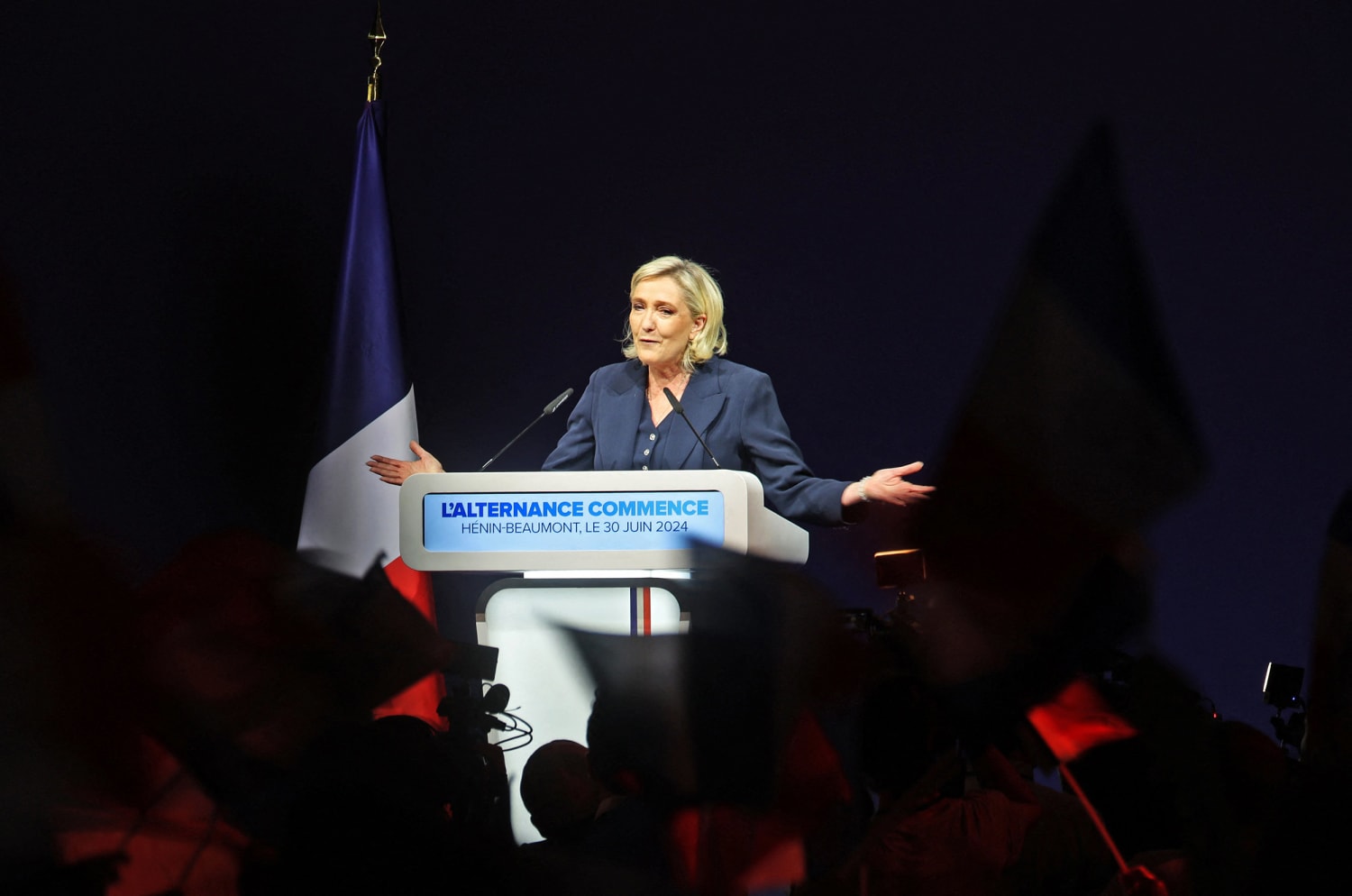France heads to the polls Sunday for the second round of parliamentary elections that will reveal how much power an ascendant far right has secured in the nation’s next government.
The snap elections, called to widespread shock less than four weeks ago by French President Emmanuel Macron, has plunged the nation into a volatile, rapid-fire election season that has inflamed tensions in the country and forced centrists to scramble to negotiate with the left to keep the far right from taking an absolute majority.
National Rally, known as RN in France, swept to victory in the first round of voting last weekend, taking a third of the votes, with a bloc of left-wing parties in second at 28%, and Macron’s centrist alliance trailing in third with just 20% after his gamble to call the election backfired spectacularly.
At stake on Sunday’s runoff election is whether the far-right National Rally will win the majority that could allow it to name a prime minister and decide domestic policy or — the more likely outcome — if centrists and the left can keep them at bay, leaving France with a hung Parliament.
Tactical alliances would hamper the far right from implementing a fiercely anti-immigration, pro-working-class domestic agenda, but likely leave Parliament locked in political paralysis and damaging inaction.
“Either way, it’s a mess,” says emeritus professor Nick Hewlett, an expert in French politics at Britain’s University of Warwick. “Macron’s attempts to govern from the center without committing himself to either progressive or reactionary politics has failed miserably, and that’s part of what’s led us here.”
To prevent a humiliating scenario where his decision brings about France’s first far-right government since the Nazi occupation in World War II, Macron has broken away from his regular allegiance with the center-right Republicans to make deals with the left in the run-up to the runoff.
To avoid splitting the anti-RN vote, more than 200 candidates have now confirmed they will not stand in the second round, according to local media estimates.
“The left just came out straight away and said they were doing this, and the center pretty much came out straight away too,” said Rainbow Murray, an expert in French politics at Britain’s Queen Mary University of London.
“They’re both coming from the same point of view, which is not to help each other, but to stop the far right,” Murray said.
This has stoked tensions on the campaign trail. More than 50 candidates and activists have come under physical attack, including government spokesperson Prisca Thevenot, whose parents are immigrants from the African island of Mauritius, while she was putting up election posters in a town near Paris on Wednesday night.
Protests have also swept the country as demonstrators call on voters to turn out against the RN, with marches in the French capital on Wednesday. The French interior minister said Thursday that 30,000 police officers will be deployed on voting day, including 5,000 in the Paris region.
But amid such tensions, this alliance also appears to be working.
After the first ballot, pollsters put the RN on track for anything between 250 and 300 seats, with 289 needed for a majority. But the first poll published after this week’s tactical withdrawals, cited by Reuters, projected that the RN and its allies could get just 190 to 220 seats.
The same poll shows that the leftist New Popular Front alliance and Macron’s centrists could win enough seats to form a coalition, but Macron has rejected the option of a coalition that would include the far-left France Unbowed party, while his Prime Minister Gabriel Attal has also dismissed the notion of a cross-party government.
In which case, the two most likely scenarios on Sunday each present unprecedented challenges for France.
A hung Parliament sets up the possibility of political paralysis and inertia, where parties cooperate through ad hoc alliances on a case-by-case basis to pass legislation, depriving France of a functioning government and potentially deepening the sense of disillusionment already felt by large swaths of the electorate.
This will not only affect France’s domestic policies, but could also stifle its international presence at the European Union and neutralize its most important leaders on the global stage.
Alternatively, France finds itself with an anti-immigrant, eurosceptic government that promises to “put France back on its feet” by giving French citizens “national preference” over immigrants for jobs and housing, while abolishing the right to automatic French citizenship for children of foreign parents and barring dual citizens from “sensitive strategic posts.”
RN’s opposition to the European Union and its historical closeness with Russia amid the war in Ukraine raises questions not just about France’s future, but about Europe’s too. RN President Jordan Bardella has countered allegations that his party is friendly toward Russia, calling the nation a “multidimensional threat” to Europe and saying he supports the continued delivery of French weaponry to Ukraine, but that he opposes sending long-range missiles capable of striking targets within Russia.
Regardless of the outcome, Hewlett says, RN is likely to claim a victory as the single biggest coherent party, emboldening the far right, which “will feel entitled to govern sooner or later.”
An Ipsos poll surveying over 10,000 voters showed the RN wields substantial support among voters of all ages, with rising support among French youth. A majority of those who identify as “disadvantaged” also overwhelmingly backed the RN.
Its popularity is a devastating rebuke of Macron’s politics, which had once galvanized the youth and promised change.
And even if the RN wins a more modest 190 seats, that would represent an astonishing increase for a party that won just eight seats in 2017.
“It’s a win for them no matter what,” Hewlett said.
#Rising #French #vies #power #runoff #elections,
#Rising #French #vies #power #runoff #elections
